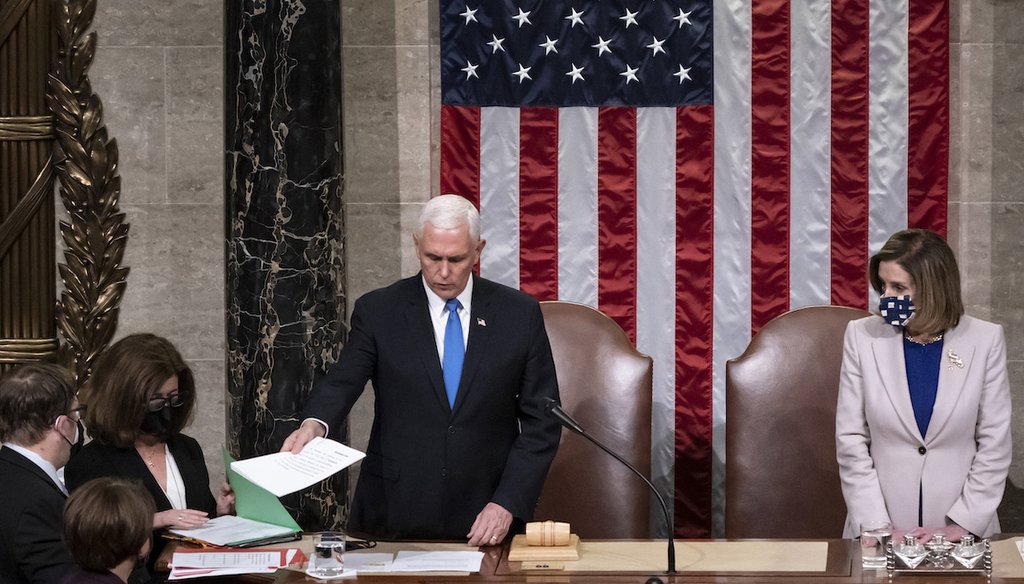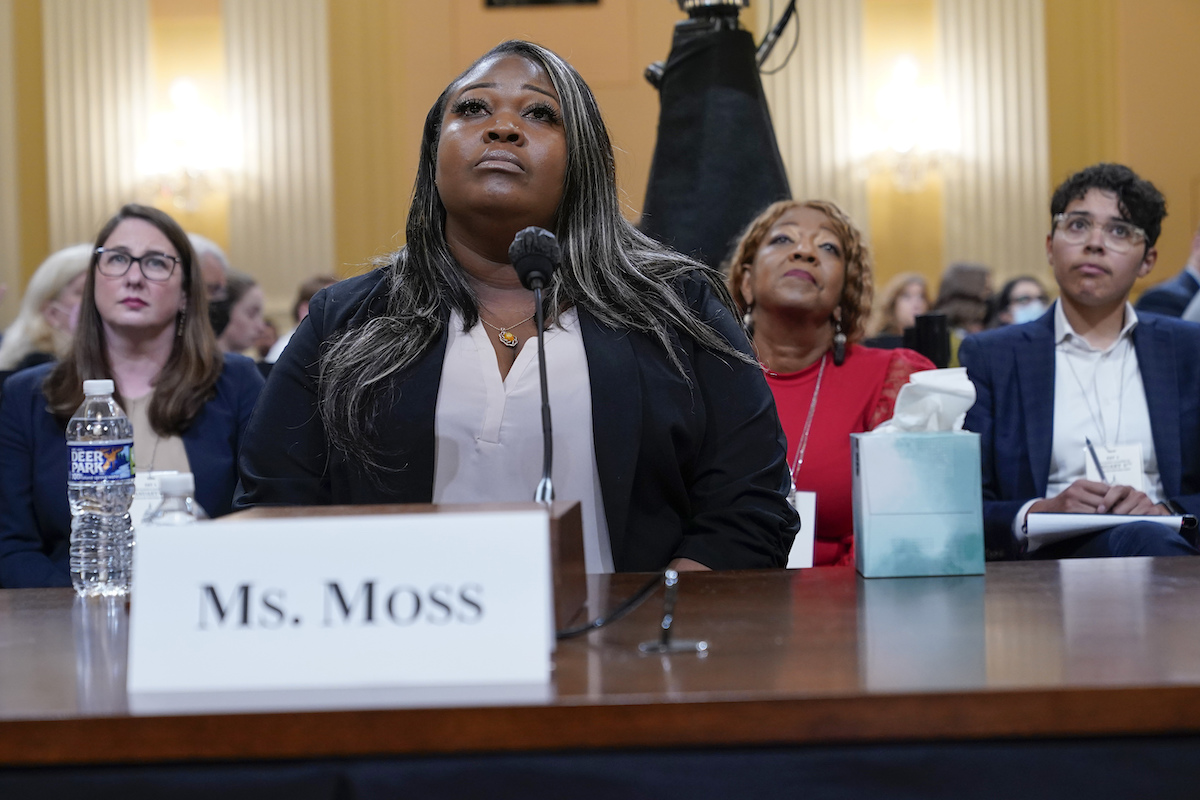Stand up for the facts!
Our only agenda is to publish the truth so you can be an informed participant in democracy.
We need your help.
I would like to contribute

Vice President Mike Pence and Speaker of the House Nancy Pelosi, D-Calif., oversee Electoral College vote certification after a mob loyal to President Donald Trump stormed the Capitol in Washington and disrupted the process, Jan. 7, 2021 (AP)
If Your Time is short
-
The Senate is considering two important pieces of legislation to protect elections and avoid some of the chaos and confusion that surrounded the 2020 election.
-
The proposed Electoral Count Reform Act specifically lists what a vice president can and cannot do when it comes to presidential elections. The legislation limits the role to announcing Electoral College results from each state.
-
The Enhanced Election Security and Protection Act would increase the penalty for threatening election workers, from one to two years in jail. The bill also requires the U.S. Postal Service to improve the processing of mail ballots.
The text of a 135-year-old law — the Electoral Count Act — was just vague enough for former President Donald Trump and his congressional allies to use dubious tactics to try to crash a normally routine process during the presidential election of 2020. Trump’s plan spurred thousands of violent protesters to riot at the Capitol.
After the Jan. 6 attack, a bipartisan group of senators introduced a bill to end ambiguities in the 1887 Electoral Count Act. The changes have received broad praise from legal experts. Some senators have also introduced a bill to increase penalties for threats against election workers and to improve the way the U.S. Postal Service handles mail ballots.
These bills are primarily aimed at the behind-the-scenes election rules that most Americans never think about, said Matthew Weil, executive director of the democracy program at the Bipartisan Policy Center.
"At the highest level, the improvements to the Electoral Count Act close ambiguities in the process that ensures the correct candidate is declared the winner," Weil said. "The vote counting and certification after Election Day should not be a gray area in law."
Here’s a guide to what the two bills, the Electoral Count Reform Act and the Enhanced Election Security and Protection Act, would do.
Electoral Count Reform Act
Clarifies and limits the role of the vice president
Normally, when Congress certifies the Electoral College vote, clerks unseal the results sent by each state, the vice president reads the results out loud, and the process moves on. There’s room for lawmakers to challenge a state’s results, but Trump zeroed in on the vice president.
Trump’s hopes for a do-over hinged on the presumption that the vice president has the authority to set aside the results from any given state, if there are reasons to question them.
The proposed bill shuts the door on that.
Not only does it say the vice president’s role is strictly "ministerial" — that is, a glorified announcer — but it specifically lists what the vice president cannot do.
"The President of the Senate (the vice president) shall have no power to solely determine, accept, reject, or otherwise adjudicate or resolve disputes over the proper list of electors," says the Electoral Count Reform Act.
Shuts the door on "alternative" slate of electors
Part of Trump’s plan was to send Congress "alternative" slates of electors backing him, rather than Joe Biden, who had officially won. The plan was to create enough confusion to give Pence the opening to reject the official results.
The bipartisan proposal largely binds Congress to accept a single slate from each state. Once the state sends a fully certified slate, the bill says it must be "treated as conclusive."
And it clarifies the way states must certify their electoral votes.
The current law fails to say who at the state level — typically, the governor or the secretary of state — has final say over certifying the slate of electors. In theory, this leaves open the possibility of a governor certifying one slate, and the secretary of state another.
The bill lets states decide who does the certification, but once a choice is made, it can’t be changed after the election.
"This prevents jostling after Election Day to convince other state officials to certify a slate that does not represent the choice of the voters — so called fake slates," said William & Mary law professor Rebecca Green. "It also makes clear that if a group of citizens decides to get together and certify an alternate slate, Congress will not heed that effort."
Closes the "failed" election loophole
A law older than the Electoral Count Act, the 1845 Presidential Election Day Act, not only sets Election Day as the Tuesday after the first Monday, it has a section about what states should do if they have "failed to make a choice" on that day.
"The electors may be appointed on a subsequent day in such a manner as the legislature of such State may direct," the law says.
The problem is that the law doesn’t define what is a "failed" election.
The new bill says only "extraordinary and catastrophic" events would be grounds for declaring a failed election.
Raises the bar for congressional challenges
Right now, all it takes is one senator and one representative to challenge the results from a given state. That has made it easy for Republicans and Democrats to raise issues in the 2020 and previous elections.
The bill would raise the threshold to 20 senators and 87 representatives.
"This reduces the likelihood of a small number of representatives and senators delaying the count or interfering in results," a bipartisan group of leading legal experts wrote on the Election Law Blog.
Enhanced Election Security and Protection Act
Adds penalties for those who threaten election administrators
Election officials have faced increased threats since the 2020 election, leading some to leave the profession. One county elections official in Colorado, Josh Zygielbaum, told PolitiFact that threats prompted him to wear a bulletproof vest.
The Enhanced Election Security and Protection Act would increase the penalty for threatening election officials, from one year to two years in jail.
But the bill doesn’t address the main concern raised by elections officials: those who make threats are rarely prosecuted. One year after the Justice Department launched a task force to investigate hundreds of threats against election workers, prosecutors have only charged three people. One person has been convicted.
Colorado Secretary of State Jena Griswold, a target of threats, told PolitiFact that "while it is certainly important to increase the penalty for threatening or intimidating election officials, those penalties are irrelevant if the individuals who break the law are not prosecuted."
Wandrea "Shaye" Moss, a former Georgia election worker who faced threats, testifies as her mother, Ruby Freeman listens, at a June 21, 2022 hearing of the House select committee investigating the Jan. 6 attack on the U.S. Capitol. (AP)
Improves the handling of mail ballots
The bill puts into law a series of requirements for the U.S. Postal Service, in an effort to improve delivery of mail ballots and increase the chances that mail ballots are received in time. Some of the provisions have already been recent postal service practice, but the bill would enshrine such practices into law.
"The Postal Service has absolutely improved how they manage vote by mail flow, but that is because it became an internal priority," Weil said. "The framework says it's now a mandate, not a choice."
The bill requires the Postal Service to dedicate at least one staff member in each state to assist election officials. It also requires postal workers in the final weeks before the election to search postal facilities daily for mail ballots and continue daily searches until after the last date on which the state accepts ballots cast in that election. Managers of postal service facilities would have to certify in a record that each ballot scheduled to depart the facility that day has departed.
The bill also requires the U.S. Postal Service to process mail the Sunday before Election Day and work extended hours as needed to deliver mail ballots.
And, it requires a postmark on all federal mail ballot envelopes, because some states set deadlines that such ballots must be postmarked by a certain date in order to be counted.
In nonfederal election years, the Postal Service would give best practice recommendations to state and local governments about the optimal timing for voters to request and return mail ballots, the design of mail ballot envelopes and other tips to improve the efficiency of voting by mail.
Additional efforts to improve security of election systems
The bill increases the penalties for individuals who steal or alter election records, from $1,000 to $10,000 and from one year to two years in prison and makes it illegal to tamper with voting systems.
What happens next
Assuming the bills get all 50 Democratic senate votes, they need 10 Republicans to avoid a filibuster.
So far, nine Republicans back the Electoral Count Reform Act. If the bill passes the Senate, passage in the House is virtually guaranteed. Sen. Amy Klobuchar, D-Minn., said that the rules committee will hold a hearing in the coming weeks on the bill.
When the Enhanced Election Security and Protection Act was announced July 20, five Republicans signed on to it.
RELATED: Poll workers are short-staffed, under attack — and quietly defending democracy
RELATED: All of our fact-checks about elections
RELATED: Trump falsely says Electoral Count Act talks prove he was right on Pence’s power
Our Sources
Sen. Susan Collins, Enhanced Election Security and Protection Act, July 20, 2022
Sen. Susan Collins, Electoral Count Reform and Presidential Transition Improvement Act, July 20, 2022
Sen. Lisa Murkowski, Senators Introduce Reforms to the Electoral Count Act of 1887, July 20, 2022
Sen. Amy Klobuchar, Press release about Electoral Count Act, July 20, 2022
Edward Foley, Why Congress should swiftly enact the Senate’s bipartisan ECA reform bill, July 20, 2022
Statutes and Stories, Presidential Election Day Act of 1845 and the Election of 1840, Aug. 3, 2020
Legal Information Institute, 3 U.S. Code § 2 - Failure to make choice on prescribed day, accessed July 21, 2022
Common Sense Americans, Elections policy brief, 2022
Middle Tennessee State University, True threats, June 2017
Justice Department, Man Pleads Guilty to Threatening Election Official, June 16, 2022
PolitiFact, Most states don’t explicitly ban guns at polls. Some lawmakers want to change that, March 31, 2022
Email interview, Rebecca Green, associate law professor and co-director, Election Law Program, July 20, 2022
Email interview, Tammy Patrick, senior advisor to the elections program at Democracy Fund, July 20, 2022
Telephone interview, Neal Kelley, chairman of the Committee for Safe and Secure Elections and retired Registrar of Voters for Orange County, California, July 21, 2022
Email interview, Matthew Weil, executive director of the Democracy Program at the Bipartisan Policy Center, July 21, 2022
Colorado Secretary of State Jena Griswold, Statement to PolitiFact, July 21, 2022
Michigan Secretary of State Jocelyn Benson, Statement to PolitiFact, July 21, 2022






















































